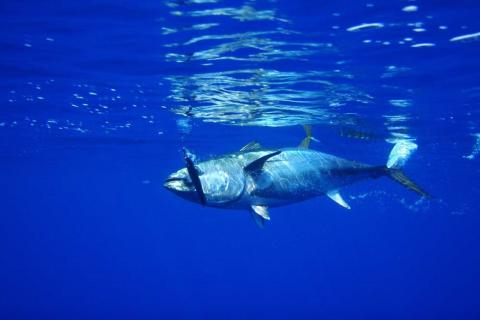The Open Ocean Trustees released their first strategic plan (PDF, 102 pages) for restoring fish and water column invertebrates injured by the Deepwater Horizon oil spill. The plan is a result of the past collaborative work of subject matter experts with input from stakeholders provided during several public engagement opportunities.
Numerous fish and invertebrate species were injured by the oil spill, so it is infeasible to plan restoration for every species injured. This strategic plan will guide effective and efficient restoration planning for these resources. The plan identifies and prioritizes:
- Fish and water column invertebrate species for restoration
- Threats and restoration opportunities for those species
- Restoration objectives
Further Highlights from the Strategic Plan:
- It incorporates input gathered during meetings and other engagements with a range of stakeholders
- High priority species were selected using an adaptive prioritization process that can be updated over time
- Priority species include blue marlin, spotted seatrout, mullets, menhaden, greater amberjack, red grouper, vermilion and red snapper, yellowfin tuna, and king mackerel
- It sets priority objectives to achieve our restoration goals for priority fish and water column invertebrate species including:
- Reducing bycatch
- Reducing illegal, unregulated, and unreported (also known as “IUU”) fishing
- Improving health of priority species by developing tools and techniques to reduce uncertainty in restoration and provide best practices to stakeholders and fishing communities
- Reducing threats from marine debris
- Reducing post-release mortality in recreational fisheries
We’ll be presenting the Fish and Water Column Invertebrates Strategic Plan at our upcoming April 12 webinar. Register and join to learn more and ask questions.
Background on the Restoration Type and Open Ocean Restoration Area:
The Fish and Water Column Invertebrates Restoration Type includes fish and invertebrates living in the open ocean—as well as Sargassum, an ecologically important algae providing food, refuge, and breeding grounds for an array of animals. The Open Ocean Trustee Implementation Group is responsible for restoring these resources and other wide-ranging and migratory species injured by the spill, including birds, Gulf sturgeon, sea turtles, marine mammals, and deep-sea coral communities. As of 2022, approximately $320 million of the $400 million allocation remains for future fish and water column invertebrate restoration planning and implementation.
Read the Strategic Plan and Fact Sheet:
- Open Ocean Fish and Water Column Invertebrates Strategic Plan (PDF, 102 pages)
- Fish and Water Column Invertebrates Strategic Plan Fact Sheet (PDF, TK pages)


